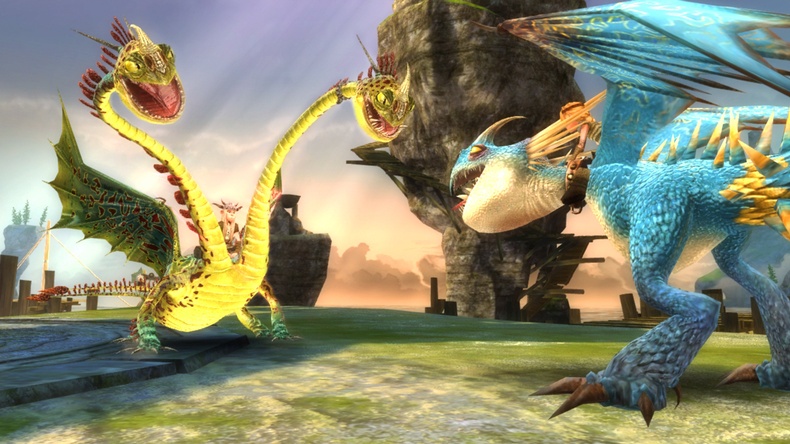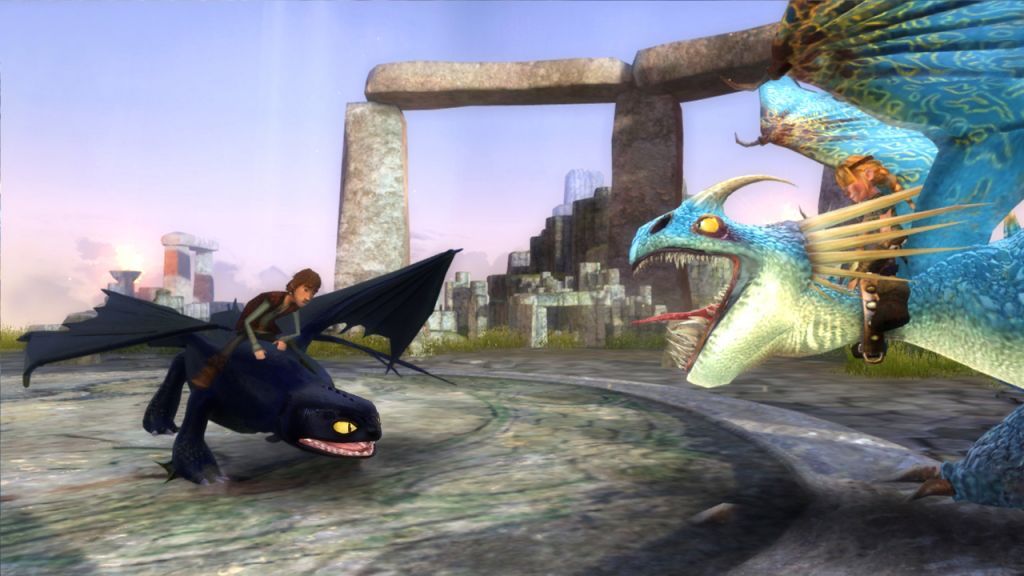This post has not been edited by the GamesBeat staff. Opinions by GamesBeat community writers do not necessarily reflect those of the staff.
Editor's note: Sure, you know that most kids games are crap. But what do kids think about them? Find out in Matthew's new review series, Dad vs. Kids. This week, Matthew and his son grind through How to Train Your Dragon. -Brett

Part 1: How to Bore Your Father
I wish I could give game recommendations based on good ideas.
The concept of How to Train Your Dragon is a solid one: coddle and teach a fire-belching lizard in the hopes of turning it into a powerhouse for what are basically Nordic cock fights. It's a lot like Pokémon — minus the satisfying sense of accomplishment or character development that's kept that series going so strong for over a decade.
I won't pretend to know what the plot of Dragon is, so I can't give you a synopsis, but my son seems to think it's safe to assume that the game takes place after the film. There is no coming of age story that thinly veils a theme of racial equality here: just straight up grinding in order to get your mount in tip-top shape for local schoolyard tournaments that put your recess dodgeball games to shame.
You go about "training" your dragon in a couple of ways. The first is by maintaining five status bars that have no bearing on anything other than your health. Your dragon raises his rest by, um, resting; everything else can be increased by hunting and gathering throughout the village for the various things that arbitrarily boost your stats. You can also go through a regime of what basically amounts to tutorials in order to earn the right to add combos and other special attacks to your move set during the tournaments.
When you finally sign up to prove your worth, you're introduced to what feels like Soulcalibur…made by first-year design students. There's a semblance of dodging, parrying, blocking and attacking, but none of it works well at all. How to Train Your Dragon breaks the first rule of fighting games by not making the hits feel gratifying. The combat looks like a bunch of flailing, which isn't helped by the egregious amount of clipping going on. Whether I approached the game as a button masher or as a strategic fighting game savant, I had a hard time of it — enough to turn me off permanently.

I have to wonder: If this game didn't have a license attached to it, if the developers had more time to flesh out the game mechanics, would How to Train Your Dragon have been something special? While raising animals/monsters for competitive reasons is nothing new, I'd like to see someone expand on the concept with a fleshed-out care program and a solid fighting engine that goes beyond the usual role-playing game trappings. I'd like to think that — even with the license attached — had they been given time to finish the game by the time the film hit DVD/Blu-Ray, How to Train Your Dragon could have been something more than a few good ideas trapped in a mediocre title.
But, as my son Owen is about to show us, good ideas can surpass poor design in the eyes of a child…
Part 2: Lusus Naturae Propagation
Dad: How would you describe How to Train Your Dragon to someone who's never played it?
Kid: It's a, like uh, high fantasy adventures. You fight dragons and have flying competitions to get other dragons to train. You have to feed your dragon and help him get food and then you have to do other competitions for other people so you can get recipes for your dragon and stuff. So mostly you're trying to train your dragon!
 D: What's your favorite part of the game?
D: What's your favorite part of the game?
K: My favorite part of the game is when you go and train up in the mountain, because then the other dragons are so easy and the ones on the competition are so much harder.
D: What's your least favorite part?
K: I hate when you have to go and do the wilderness and you have to do the flying competition, because I'm just bad at flying.
D: What would you add to the game to make it better?
K: Add more dragons to choose from.
D: But aren't there a lot already?
K: Well, you can only pick four dragons and you can only win four dragons. There's more dragons on the movie.
D: What are your thoughts on the fighting?
K: Uh. [Laughs] Using the moves that you get when you go to training camp. Always try to defend when they are trying to attack. Just keep on fighting until they don't keep fighting back to you, because that should break their defense.
D: What do you think about the parts where you have to gather ingredients and feed your dragon?
K: Some of them are hard because this one I had to get 40 chickens but I didn't know how to get them, and my cousin figured out you had to press X to catch them. I also thought there were some cool ones where you had to get some minerals and potions. And that's really it.

D: Do you think the game is hard?
K: I think it's pretty medium, I guess.
What do you mean?
Because it's like sometimes it gets kind of hard, when you have to train two dragons. One has to do more camp training than the other. But the easy part is when you have to do the Thor Thursday competition because then when you attack so many times they're never good against you again. And then you win another dragon who's better than the others. Unless, of course, it's the same dragon.
Would you recommend this game to your friends?
Yeah…because it's a really good fighting game, and lots of kids like fighting games, instead of boring, walking around games.
There isn't nearly enough information for parents with regard to the games their kids play, and that which is out there is usually overly biased or only concerned with their ratings rather than their quality. Dad vs. Kids, a review series in which I pit my opinions on games against those of my oldest son, hopes to address that issue. Part one is a frank article about the game, written by someone who's played enough of it to give valid criticism while still remaining open-minded. Part two is an interview with my son, in which he gives his views and additional insight for the demographic in which these games are made for. In other words, it gives him a reason to disprove his old man.
